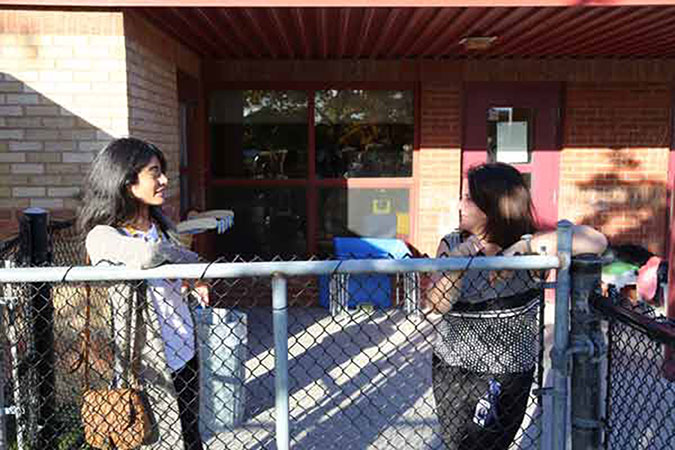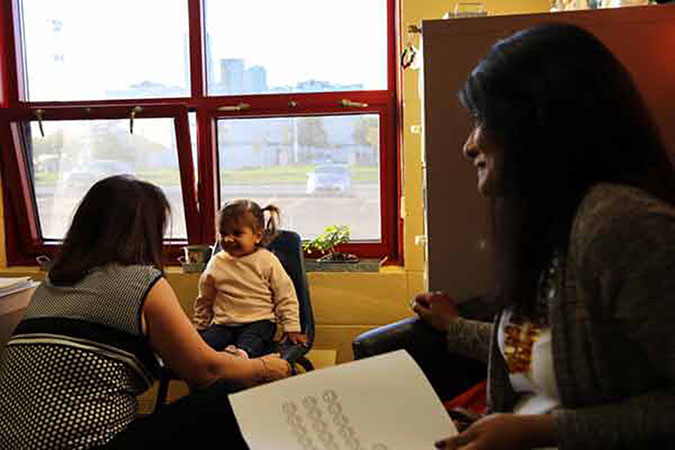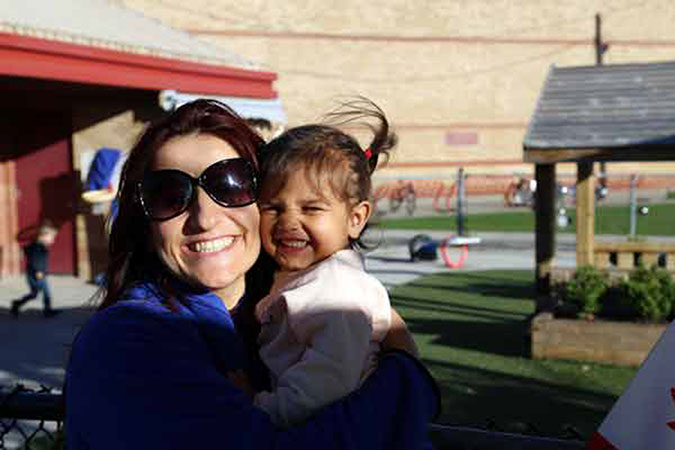view all PLASP BLOG posts
We follow up with Mom Noreen and Baby Leila, one year later.
A little over a year ago, we talked to Mom Noreen about her search for child care for her baby, Leila, who was about turn a year old. “Peace of mind is key,” said Noreen, in the interview for the PLASP blog. It was also around that time that the Ministry of Education launched the Child Care and Early Years Act (August, 2015).
One year later, we visited with Noreen and Leila at the PLASP Early Learning and Child Care Centre to find out how both Mom and Leila were doing, and to see first hand how the new legislation governing licensed child care was benefitting Noreen and her family.

"The staff at the child care centre reassured Noreen that the transition for Leila was not uncommon, indicating that it would become easier for Leila as she adjusted to the new routine."
For Noreen, the first few months were difficult as Leila transitioned from being at home. “I remember feeling anxious,” Noreen admitted. “I wondered if I was doing the right thing for my child and for my family.” The staff at the child care centre reassured Noreen that the transition for Leila was not uncommon, indicating that it would become easier for Leila as she adjusted to the new routine. “The hardest thing for me was to accept that not everything would be perfect at the beginning, and I needed to allow time for the adjustment period,” Noreen recalls. “The PLASP staff were very open and willing to work with me and answer all my questions. I appreciated the level of communication between the PLASP staff and my family – I think that strong communication is a strong indicator of the quality of care Leila receives. And because of that, I trusted the staff and their ability to do their job.”

At PLASP, relationships among children, families, and staff is part of the PLASP program statement and is consistent with the Ministry of Education policies, pedagogy and curriculum.
At PLASP, relationships among children, families, and staff is part of the PLASP program statement and is consistent with the Ministry of Education policies, pedagogy and curriculum. It’s a core value PLASP to foster collaborative and co-operative relationships with the families in our programs. Relationships of trust, as demonstrated by Noreen and the PLASP program staff, are the basis for learning and co-operation.
Eventually, Noreen began to see a difference in Leila – as she started to build bonds with the PLASP staff. “When I heard Leila talking about the PLASP staff at home and went running to them when my husband dropped her off in the morning, I knew we had done the right thing,” says Noreen.

“When I heard Leila talking about the PLASP staff at home and went running to them when my husband dropped her off in the morning, I knew we had done the right thing,” says Noreen.
As well, Leila also started sleeping better – napping regularly at the child care centre – and also began to dress herself. She began to eat better at home, not just in the quantity of her meals but also in her willingness to try new foods.
These examples, provided by Noreen, are all part of the goals outlined in the PLASP program statement, including the health, safety, nutrition and well-being of children. Knowing that the early years set the foundation for children’s health and well-being, PLASP collaborates with a registered dietician to develop menus for programs that are nutritious and appealing for children. In addition, PLASP programs provide rest time for children who require it, based on their developmental needs and daily opportunities for physical activity and active outdoor play.
“Leila also does amazing things physically,” Noreen says. “She is always running around, jumping and climbing on things. She loves to sing songs, she sings the whole alphabet and counts from one to ten, usually skipping numbers four and six.”

Fostering children’s exploration, play and inquiry is a contributing factor in assisting children to develop a sense of sense, health and well-being.
Fostering children’s exploration, play and inquiry, as shown by Leila, is a contributing factor in assisting children to develop a sense of sense, health and well-being. It’s evident in our goals for children, consistent with the Ministry of Education pedagogy:
-
Every child has a sense of belonging when he or she is connected to others and contributes to their world.
-
Every child is developing a sense of self, health, and well-being.
-
Every child is an active and engaged learner who explores the world with body, mind, and senses.
-
Every child is a capable communicator who expresses himself or herself in many ways.
One of the biggest changes that Noreen has observed in Leila is her ability to self-regulate and express herself. “Not only has Leila become flexible and adaptable to new people and environments, she’s also become very independent and very sociable,” says Noreen, acknowledging that Leila knows the names of all her peers, and knows their parents as well. “She knows more moms and dads at the centre than I do,” Noreen says with a laugh. “But perhaps the biggest thing in Leila’s development is how well she communicates. She is able to share her needs and wants with me pretty clearly for her age.”
Leila has definitely grown from the infant we first met to an active, inquisitive child. We asked Noreen what piece of advice she received when she was first considering child care for Leila, that she would pass on to new parents about to embark on the same process.
“I was told to trust my instincts,” Noreen remembers. “And that really is important. We visited the centre prior to registering and spent a lot of time talking to other parents about their experiences with daycare. But more than that, it was meeting the staff and observing how they interacted with Leila. You want to find a child care provider that engages with your child and cares about their well-being.”

“You want to find a child care provider that engages with your child and cares about their well-being.”
Is your experience with PLASP similar to Noreen’s and Leila’s? Want to share your family’s experience with PLASP programs and the positive impact on your child’s development? Please leave a comment in the section below.
For more information about the PLASP curriculum and guideline, please refer to our program statement.
For more information on the Ministry of Education’s pedagogy document, referenced in this article, please visit their website.
Read more about Noreen and Leila’s journey with PLASP here.
To ensure no comment gets left unread, your comments are moderated and won't appear until approved. Comments relating to your child’s registration in a PLASP program including but not limited to program requests, cancellations and additions can not be addressed through the PLASP blog and will not appear. If you require assistance registering or making changes to your child’s program, please call Parent Services at 1.888.739.4102 between 7 a.m. and 6 p.m., Monday to Friday.
PLASP Child Care Services